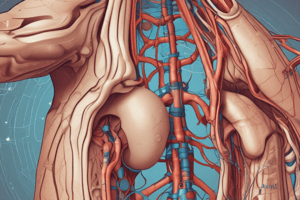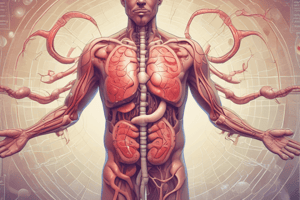Podcast
Questions and Answers
What distinguishes physiology from anatomy?
What distinguishes physiology from anatomy?
- Physiology is not related to the study of living organisms.
- Physiology only studies microscopic organelles.
- Physiology focuses on the structure of body organs.
- Physiology focuses on the function of body structures. (correct)
When was physiology formalized as a medical discipline?
When was physiology formalized as a medical discipline?
- Around 420 BC during the time of Hippocrates. (correct)
- During the Renaissance period.
- In ancient Greece.
- In the 19th century.
What is the focus of exercise physiology?
What is the focus of exercise physiology?
- The study of plant physiology.
- The study of the physiology of physical exercise. (correct)
- The study of genetics and heredity.
- The study of geophysical processes.
Which branch of physiology investigates how organisms adapt to their environments?
Which branch of physiology investigates how organisms adapt to their environments?
What does defense physiology study?
What does defense physiology study?
Which ancient civilizations have roots in the history of physiology according to the text?
Which ancient civilizations have roots in the history of physiology according to the text?
Who coined the theory of the four humors in physiology history?
Who coined the theory of the four humors in physiology history?
Which key figure is referred to as the founder of experimental physiology?
Which key figure is referred to as the founder of experimental physiology?
Who introduced the term 'physiology' in the 15th century?
Who introduced the term 'physiology' in the 15th century?
What type of research does Extreme Physiology & Medicine focus on?
What type of research does Extreme Physiology & Medicine focus on?
What does evolutionary physiology study?
What does evolutionary physiology study?
What is the primary focus of physiology research according to the text?
What is the primary focus of physiology research according to the text?
Study Notes
Physiology: The Study of Life's Functions and Processes
Physiology is a branch of biology that deals with the functions and activities of living organisms, including their organs, tissues, cells, and the physical and chemical phenomena involved. It is closely related to the study of anatomy but focuses more on the function of body structures rather than their structure. Physiology has a rich history, tracing back at least to ancient India and Egypt, and was formalized as a medical discipline in the time of Hippocrates around 420 BC.
Human Physiology
Human physiology is a subcategory of physiology that specifically focuses on the functions and processes within the human body. It is divided into various subcategories, ranging from microscopic organelles in cell physiology to wider topics like ecophysiology, which investigates how organisms adapt to their environments.
Branches of Physiology
Physiology encompasses a wide range of topics. Some of the main branches include:
- Exercise Physiology: The study of the physiology of physical exercise, including bioenergetics, biochemistry, cardiopulmonary function, biomechanics, hematology, skeletal muscle physiology, neuroendocrine function, and nervous system function.
- Defense Physiology: The study of changes that occur in response to potential threats, such as the fight-or-flight response.
- Evolutionary Physiology: The study of the role of behavior in evolution, sexual selection, and physiological changes in relation to geographic variation.
History of Physiology
Physiology has a long and rich history, with many key figures contributing to its development. Hippocrates coined the theory of the four humors, stating that the body contains four distinct bodily fluids: black bile, phlegm, blood, and yellow bile. Galen, also known as Claudius Galenus, was the first to use experimentation to derive information about the systems of the body and is widely referred to as the founder of experimental physiology. Jean Fernel, a French physician, introduced the term "physiology" in the 15th century.
Current Research in Physiology
Today, physiology research continues to advance our understanding of the human body and its functions. Journals such as Extreme Physiology & Medicine publish research on integrative human physiology under conditions of physiological stress, such as environmental, exertional, or clinical stress. This research can enhance our understanding of physiology in various contexts and has implications for human disease states.
In conclusion, physiology is a vast and essential field of study that explores the functions and processes of living organisms. It has a rich history and encompasses a wide range of topics, from the microscopic world of cells to the study of whole organisms and their adaptation to environments. Current research continues to expand our knowledge of physiology and its relevance to human health and disease.
Studying That Suits You
Use AI to generate personalized quizzes and flashcards to suit your learning preferences.
Description
Test your knowledge on the study of life's functions and processes with this quiz. Explore topics such as human physiology, branches of physiology, the history of physiology, and current research in the field.




